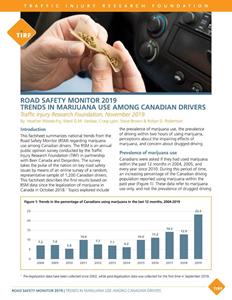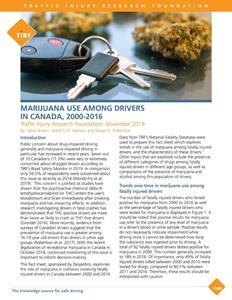Road Safety Monitor 2019: Trends in Marijuana use among Canadian Drivers

Download
Road Safety Monitor in English: Road Safety Monitor 2019: Trends in
Marijuana use among Canadian Drivers
www.tirf.ca/road_safety_monitor_2019_trends_marijuana_use_canadian_drivers
Traffic Injury Research Foundation
Marijuana Use Among Drivers in Canada, 2000-2016

Download
Fact Sheet in English: Marijuana Use Among Drivers in Canada, 2000-2016
www.tirf.ca/marijuana_use_drivers_canada_2000_2016
Traffic Injury Research Foundation
Data indicate marijuana use as well as driving within two hours of using marijuana has substantially increased along with public concern just one year following the legalization of marijuana in Canada. This RSM data represents one of the first comparisons of self-reported driving after using marijuana in Canada one year prior to legalization and one year following it. The analysis reveals the percentage of drivers who report driving within two hours of marijuana use increased to 7% in 2019, up from 3.3% just one year ago.
“In the five years leading up to the legalization of marijuana, a generally increasing trend in use prior to driving has been clearly evident,” explains Dr. Heather Woods Fry, TIRF Research Scientist. “The significant increase in past-year, self-reported use prior to driving would suggest much more intensive education and enforcement are needed.”
Steady increases in public concern about drug-impaired driving generally and, more specifically, marijuana-impaired driving in recent years may be reflective of growing awareness about the impairing effects associated with marijuana. Seven out of 10 Canadians (71.3%) were very or extremely concerned about drugged drivers according to the 2019 poll, up from 59.5% in 2014. This concern is warranted in light of available evidence suggesting the drug is associated with increases in crash risk.
This concern is backed up by an examination of trends among drivers in fatal crashes between 2000 and 2016. During this timeframe, among fatally injured drivers tested for drugs, 15.9% were positive for marijuana in 2000 compared to 23.3% in 2016. In addition, almost two in five drivers killed in road crashes that tested positive for marijuana also tested positive for another substance which was most often alcohol. This pattern is worrying because research indicates the impairing effects of marijuana and alcohol combined are more impairing than either substance alone.
“To make an equitable comparison using 2016 data only, the fact that 2.3% of Canadians reported driving within two hours of using marijuana, but 23.3% of drivers killed in road crashes tested positive for the substance should give us all pause,” cautions Dr. Ward Vanlaar, Chief Operating Officer of TIRF. “In light of the increase to 7% in 2019, Canadians who doubt marijuana has some effect on crash risk should consider the math before getting behind the wheel.”
Continued monitoring of important indicators is essential to evaluate the effects of this legislation and ensure adequate resources are allocated to support intensive enforcement and public education initiatives. Much more concerted efforts are needed to inform Canadians about risks and challenge widespread misperceptions about marijuana use and driving.
About the Traffic Injury Research Foundation:
The mission of the Traffic Injury Research Foundation (TIRF) is to reduce traffic-related deaths and injuries. TIRF is an independent, charitable road safety research institute. Since its inception in 1964, TIRF has become internationally recognized for its accomplishments in identifying the causes of road crashes and developing programs and policies to address them effectively.
About the poll:
These results are based on the RSM, an annual public opinion poll developed and conducted by TIRF. A total of 1,200 Canadians completed the poll in 2019. Results can be considered accurate within plus or minus 2.8%, 19 times out of 20. The majority of the questions were answered using a scale from one to six where six indicated high agreement, concern, or support and one indicated low agreement, concern or support.
The mission of the Traffic Injury Research Foundation (TIRF) is to reduce traffic-related deaths and injuries. TIRF is an independent, charitable road safety research institute. Since its inception in 1964, TIRF has become internationally recognized for its accomplishments in identifying the causes of road crashes and developing programs and policies to address them effectively.
About the poll:
These results are based on the RSM, an annual public opinion poll developed and conducted by TIRF. A total of 1,200 Canadians completed the poll in 2019. Results can be considered accurate within plus or minus 2.8%, 19 times out of 20. The majority of the questions were answered using a scale from one to six where six indicated high agreement, concern, or support and one indicated low agreement, concern or support.

No comments:
Post a Comment